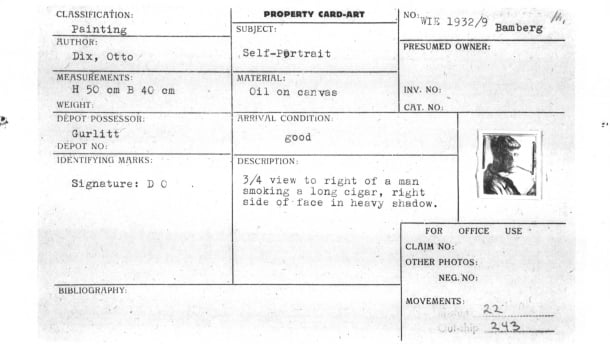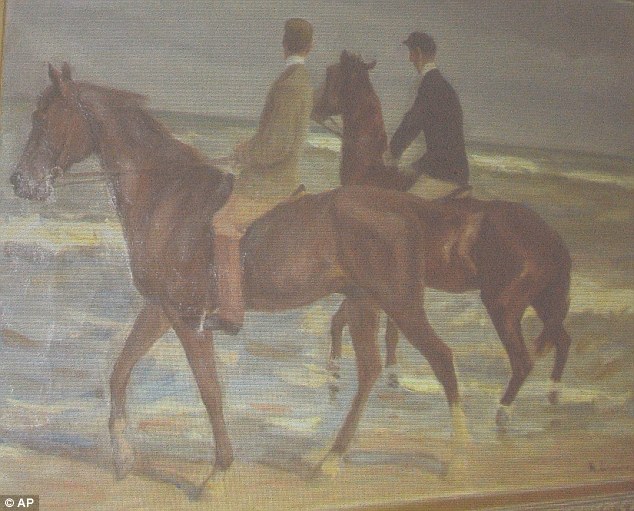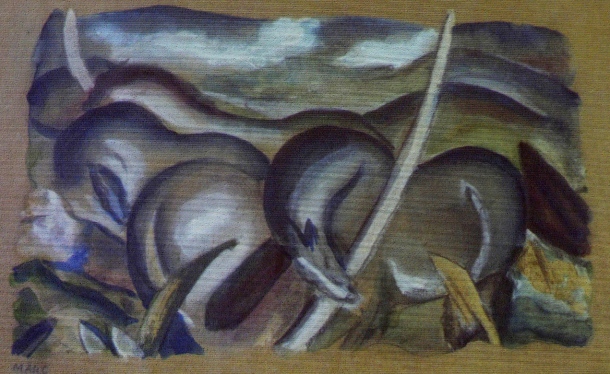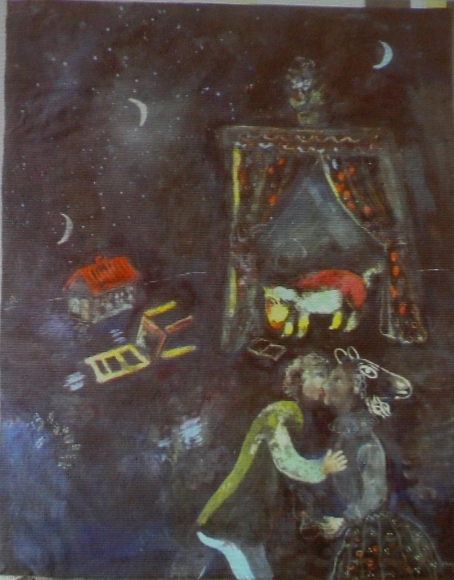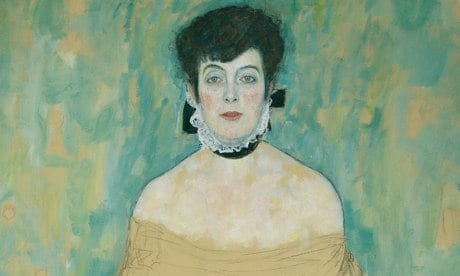Der Spiegel reports today (link in German) about how German museums are joining the chorus of frustration about the lack of information about the Hildebrand and Cornelius Gurlitt collection find. From this perspective, this development is not a surprise. I was speaking to an international law class last night at Sarah Lawrence College, and one of the students asked me what the reaction in Germany would be. My feeling was that sooner rather than later, the German museum community, and likely the federal government, will push for a forward-looking solution. Present-day Germany takes questions about the Holocaust quite seriously, and for this collection to have turned up in Germany is sparking an embarrassment that could lead to more decisive action. The problem right now seems to be that everyone is waiting for someone else to make the first move.
German Museums Join in Demands for More Information About Gurlitt; Links to the Amber Room Theorized; Dix Painting Was Not Unknown
Topics: Jeu de Paume, unbekannte Meisterwerke, February 13 1945, FAZ, Focus, Hildebrand Gurlitt, Dresden firebombing, Max Fisher, Cornelius Gurlitt, S. Lane Faison, Linz Führermuseum, Munich Central Collecting Point, Monopol, Wiesbaden Collecting Point, Dresden, HARP, Reinhard Nemetz, Max Liebermann, WWII, Monuments Men, Gurlitt Collection, Max Beckmann, Otto Dix, Degenerate Art: The Fate of the Avant-Garde in Naz, Auktionshaus Lempertz, Entartete Kunst, Fine Arts and Archives Program, Nazis, Marc Chagall, Organisation Todt, Paul Klee, Entdeckung verschollener Kunst, beschlagnahmte Bilder, Dresdner Bank, Belvedere, Fritz Todt, Holocaust Art Project, Hamburg Kunstverein, MFAA, Roberts Commission, Angela Merkel, Restitution, Wien, Monuments Fine Arts and Archives, Selbstporträt, World War II, degenerate art, Erben, Raubkunst-Bildern, Portrait of Wally, Washi, Löwenbändiger, Austria, Franz Marc, Oskar Kokoschka, Washington Principles, Ernst Ludwig Kirchner, München, Pablo Picasso, Dr. Herman Voss, Museums, Kristallnacht, Riders on the Beach, Hans Posse, Nazi Raubkunst, Vienna, Alfred Weidinger, Henri Matisse, Self Portrait, Emil Nolde
Focus Turns to Hildebrand Gurlitt’s Postwar Interrogation; Cornelius Gurlitt’s Whereabouts. Belvedere Official Questions Whether Collection Was Really a Secret
Topics: Jeu de Paume, unbekannte Meisterwerke, February 13 1945, FAZ, Focus, Hildebrand Gurlitt, Dresden firebombing, Max Fisher, Cornelius Gurlitt, S. Lane Faison, Linz Führermuseum, Munich Central Collecting Point, Monopol, Wiesbaden Collecting Point, Dresden, HARP, Reinhard Nemetz, Max Liebermann, WWII, Monuments Men, Gurlitt Collection, Max Beckmann, Degenerate Art: The Fate of the Avant-Garde in Naz, Auktionshaus Lempertz, Entartete Kunst, Fine Arts and Archives Program, Nazis, Marc Chagall, Organisation Todt, Paul Klee, Entdeckung verschollener Kunst, beschlagnahmte Bilder, Dresdner Bank, Belvedere, Fritz Todt, Holocaust Art Project, Hamburg Kunstverein, MFAA, Roberts Commission, Angela Merkel, Restitution, Wien, Monuments Fine Arts and Archives, World War II, degenerate art, Erben, Raubkunst-Bildern, Portrait of Wally, Washi, Löwenbändiger, Austria, Franz Marc, Oskar Kokoschka, Washington Principles, Ernst Ludwig Kirchner, München, Pablo Picasso, Dr. Herman Voss, Kristallnacht, Riders on the Beach, Hans Posse, Nazi Raubkunst, Vienna, Alfred Weidinger, Henri Matisse, Emil Nolde
Hildebrand Gurlitt Interview Transcript is Located
The Commission for Looted Art in Europe has located the transcript of the interview taken of Hildebrand Gurlitt at the end of World War II, concerning the bulk of what now seems to have been found in his son's apartment. Gurlitt denies buying art in France. The document is linked above.
Topics: Hildebrand Gurlitt, Gurlitt Collection, Restitution, World War II
"Here and Now": Questions Remain About Nazi-Looted Art Trove
In case you missed it live, WBUR's "Here and Now" has posted the story and audio from today's interview about the Cornelius Gurlitt Nazi-looted art find.
Topics: Jeremy Hobson, Gurlitt Collection, Restitution, Events, Here & Now, World War II, Nicholas O'Donnell, Art Law Report
Merkel Hints at Putting Gurlitt Lists Online, Calls for Special Tribunal Are Made
Catherine Hickley reports from Berlin that the government of Chancellor Angela Merkel is looking into ways to put lists and/or photographs online concerning the Cornelius Gurlitt seizure of roughly 1,400 paintings with connections to Nazi looting. This followed heavy complaints in the first days of the revelation, that the government had failed to identify what has been found. The biggest question remains why this remained a secret for roughly two years since the discovery. Merkel’s government claimed yesterday it learned of the find only in the last few months.
Topics: Stephanie Barron, Jeu de Paume, unbekannte Meisterwerke, Focus, Hildebrand Gurlitt, Theo Hermsen, S. Lane Faison, Linz Führermuseum, Munich Central Collecting Point, Wiesbaden Collecting Point, HARP, Max Liebermann, WWII, Monuments Men, Alt Aussee, Gurlitt Collection, Max Beckmann, Association for Research into Crimes Against Art, Monuments, Degenerate Art: The Fate of the Avant-Garde in Naz, Albrecht Dürer, Auktionshaus Lempertz, Entartete Kunst, Fine Arts and Archives Program, Nazis, Marc Chagall, Paul Klee, Entdeckung verschollener Kunst, beschlagnahmte Bilder, Holocaust Art Project, Judge Arthur Tompkins, Roberts Commission, Angela Merkel, Restitution, 1939 Galerie Fischer auction, World War II, degenerate art, Capt. Doubinsky, Los Angeles County Musuem of Art, Erben, Raubkunst-Bildern, Altmann v. Republic of Austria, Portrait of Wally, Löwenbändiger, Marc Masurovsky, Franz Marc, Oskar Kokoschka, Ernst Ludwig Kirchner, München, Pablo Picasso, ARCA, Lawyers' Committee for Cultural Heritage Preservat, Nazi Raubkunst, Henri Matisse, Emil Nolde
"Here and Now" on WBUR Tomorrow to Discuss Gurlitt Nazi Art Find in Munich
I'll be a guest on "Here and Now" on WBUR (syndicated nationally, and available for live streaming on WBUR's website) tomorrow between noon at 1:00 pm to discuss this week's discovery of nearly 1,400 paintings had been found in the Munich apartment of Cornelius Gurlitt two years ago (and ongoing updates), and the theme of Nazi looted art more generally.
Topics: Cornelius Gurlitt, Nazi-looted art, Gurlitt Collection, Munich, Restitution, Events, World War II, WBUR, Here and Now
New Details, More Questions Than Answers in Gurlitt Nazi-Tinged Painting Find in Munich
The Bavarian prosecutor held a press conference today to discuss the revelation this weekend in Focus that nearly 1,400 paintings had been found in the Munich apartment of Cornelius Gurlitt two years ago, after he aroused suspicion by bringing a large amount of cash back into Germany from Switzerland in 2010. This continues to shape up as the biggest restitution story in decades, perhaps ever. Among the key updates provided today by Sigfried Köble and Reinhard Nemetz, the customs official and prosecutor in charge, respectively:
Topics: Frankfurter Allgemeine Zeitung, unbekannte Meisterwerke, Focus, Hildebrand Gurlitt, Alfred Flechtheim, the Lion Tamer, Cornelius Gurlitt, Reinhard Nemetz, Anne Weber, Gurlitt Collection, Max Beckmann, Bloomberg, Otto Dix, Commission for Looted Art in Europe, Art Market Monitor, Auktionshaus Lempertz, Entartete Kunst, Meike Hoffmann, Marc Chagall, Entdeckung verschollener Kunst, beschlagnahmte Bilder, Kunsthistorikerin, Sigfried Köble, Restitution, Der Spiegel, World War II, Süddeutsche Zeitung, Erben, Raubkunst-Bildern, Löwenbändiger, München, Nazi Raubkunst
Paintings Targeted by the Nazis Found in Munich, Could be Biggest Discovery Since the War. What Now?
The German magazine Focus broke a story over the weekend that could be the biggest restitution news since Portrait of Wally or Altmann v. Republic of Austria: roughly 1,400 paintings were found in a Munich apartment that may have been seized, looted, or sold bought under duress by the Nazis in the 1930s as part of their drive to purge what they called “degenerate”—but extremely lucrative—art (the Focus coverage is extensive and excellent, though fair warning, in German). The paintings, which were apparently recovered not recently, but in 2011 as part of a customs seizure related to a currency declaration of all things, include works by Pablo Picasso, Henri Matisse, Marc Chagall, Emil Nolde, Franz Marc, Max Beckmann, Paul Klee, Oskar Kokoschka, Ernst Ludwig Kirchner, Max Liebermann and Albrecht Dürer, from collections traced back to Paul Rosenberg and others who had to abandon their property during the war, all long thought lost to the destruction of the war. They are valued in excess of 1 billion euros.
Topics: Stephanie Barron, unbekannte Meisterwerke, Focus, Hildebrand Gurlitt, S. Lane Faison, Linz Führermuseum, Max Liebermann, WWII, Monuments Men, Alt Aussee, Gurlitt Collection, Max Beckmann, Degenerate Art: The Fate of the Avant-Garde in Naz, Albrecht Dürer, Auktionshaus Lempertz, Entartete Kunst, Nazis, Marc Chagall, Paul Klee, Entdeckung verschollener Kunst, beschlagnahmte Bilder, Restitution, 1939 Galerie Fischer auction, World War II, degenerate art, Los Angeles County Musuem of Art, Erben, Raubkunst-Bildern, Altmann v. Republic of Austria, Portrait of Wally, Löwenbändiger, Franz Marc, Oskar Kokoschka, Ernst Ludwig Kirchner, München, Pablo Picasso, Lawyers' Committee for Cultural Heritage Preservat, Nazi Raubkunst, Henri Matisse, Emil Nolde
Dispute Over "Portrait of Amalie Zuckerkandl" on Loan to National Gallery—Calls for Restitution Put International Respect for Final Judicial Awards, Other Claims, at Risk
A recent loan to the National Gallery in London has grabbed headlines discussing the history of the painting, Portrait of Amalie Zuckerkandl, by Gustav Klimt, surrounding World War II and the persecution of Jews in Austria. Somewhat puzzlingly, the coverage has downplayed the fact that that very painting was already the subjective of an exhaustive proceeding in Austria that denied restitution, a decision reviewed and affirmed by the Austrian Supreme Court (though, apparently, also the subject of more recent requests for reconsideration). Should a claim for restitution or seizure be filed while the painting is outside Austria, in the UK or the US, it could have a troubling effect on respect for final judgments, as well as unintended consequences for restitution claimants who may find their judgments collaterally attacked elsewhere. As difficult as it may seem, the painting cannot be disturbed without putting a great deal more at risk.
Topics: Maria Altmann, Portrait of Adele Bloch-Bauer, Jonathan Jones, National Gallery London, the Guardian, Vita Künstler, Dr. Erich Führer, Beethoven Frieze, Belvedere, the United Nations Convention on the Recognition a, Jugendstil, Portrait of Amalie Zuckerkandl, Hermine Müller-Hofmann, Amalie Zuckerkandl, Restitution, Neue Galerie, World War II, Foreign Sovereign Immunities, Facing the Modern: The Portrait in Vienna in 1900, Kokoschka, Secession, Secession Museum, Austria, Ferdinand Bloch-Bauer, Fin de siècle, Gustav Klimt, Vienna, Anschluss, UNCITRAL
Does The Art World Have a Russia Problem?
Several overlapping issues in recent months have turned what was an awkward elephant in the room into a major issue facing the art world today. Namely: the increasing role that Russia is playing in restitution, loans and exhibition controversies has aggregated to Vladimir Putin an extraordinary amount of influence over these major international legal issues. Combined with the Edward Snowden controversy (and the bizarre story of Putin’s theft of Robert Kraft’s New England Patriots Super Bowl ring), it seems quite clear that Putin enjoys that spotlight. That has not proven to be good news for the art world.
Topics: Nazi Germany, Russia, Germany, WWII, Foreign Sovereign Immunities Act, Red Army, Edward Snowden, FSIA, Restitution, New England Patriots, Super Bowl, Vladimir Putin, Robert Kraft, Soviet Union

